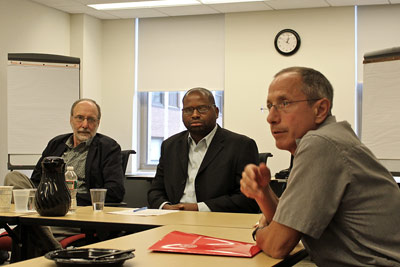ILR School Worker Institute hopes to inform public policy and strategic innovation
By Caroline Shin

With election 2012 under way, Cornell's Worker Institute comes at a critical time.
"The next 30 years is up for grabs," said Jeffrey Grabelsky, director of Cornell's Construction Industry Program in the ILR School. "Some people don't see a need for collective representation."
The Worker Institute (WI) of the ILR School held a media luncheon at the ILR Conference Center in New York City Aug. 15, ahead of its official launch Sept. 12. WI is a forum for research and education on labor issues to promote worker rights, collective representation and policy reform across a range of industries. It also provides short- and long-term consulting for labor and other organizations nationwide and internationally.
"Labor is having a very difficult time trying to find a new vision for the modern era," said Marc Bayard, WI's executive director, remarking on the dissolution of the Occupy movement, which pushed labor issues into the national conversation.
"We want to help bring unions into the 21st century, but it's not just about unions. We also work with other organizations promoting collective representation, from worker centers in the U.S. to works councils in Europe and the U.N.'s International Labour Organization," said Lowell Turner, WI academic director. "We're interested in innovation, not just holding down the fort."
One of WI's initiatives is a one-year leadership development program that teaches strategic innovation to upcoming labor leaders. The institute also fosters collaboration among the practitioners and labor researchers as part of a broad network of organizations sharing similar values.
One of its initiatives, for example, is helping to assess costs and benefits of green-retrofitting 100 buildings in New York, with an emphasis on creating high-quality jobs.
One challenge resides in "transforming precarious work into more secure employment, and this requires organization and pressure," said Turner of part-timers, the self-employed and on-call workers who do not receive high wages, benefits, collective representation or job security.
Although WI is nonpartisan, the labor situation has "less to do with legislation and more to do with strategic innovation," said Grabelsky.
Turner suggested that voters ascertain candidates' support for the International Labour Organization's charter of workplace rights: the freedom of association and collective bargaining; no forced labor; no child labor; no unfair discrimination among workers.
"This is a moment of opportunity, but there's a danger if we do not contribute to public discourse," said Grabelsky.
WI's formal launch is Sept. 12 at the Service Employees International Union, 25 W. 18th St., New York City; a panel discussion will address "Strengthening Worker Voice, Advancing Economic Fairness," 5:30-8:30 p.m.
For more information contact Legna Cabrera, Worker Institute program manager: ljc46@cornell.edu.
Caroline Shin is a freelance writer in New York City.
Get Cornell news delivered right to your inbox.
Subscribe